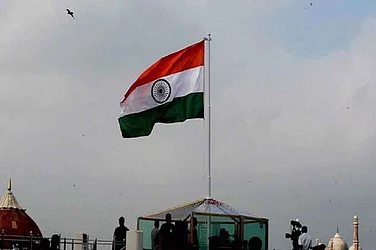Ahead of the 2012 Assembly elections in Uttar Pradesh, the BJP had promised to distribute one cow to every poor household. Rashid Alvi, who was the Congress spokesman then, had shot back at the BJP, saying that the free cows distributed by the party would not produce any milk. Over a decade later, the BJP seems to have successfully milked the holy cow, not just in UP, where it came to power in 2017, but also across the country. In 2017, Prime Minister Narendra Modi launched a ‘Pashu Arogya Mela’ (cattle health fair) in UP, and in 2018, the party once again promised to distribute one lakh cows.
Meanwhile, abattoirs were closed, and cow protection laws strengthened over the next six years. In 2020, the Yogi Adityanath government passed new laws that ensure 10 years (maximum) of rigorous punishment and a fine up to Rs five lakh to prevent cow slaughter. The ordinance made the existing cow protection laws in UP even more robust. In case of illegal transportation of cows and other bovines, the driver, operator and the owner of the vehicle shall be charged under the new Act unless proven that the transportation was done without the owner’s knowledge by someone else for committing the crime. Since the shutting of abattoirs led to an increase in stray cattle, the government spent money on setting up gaushalas and spent crores on the upkeep of stray cattle. The state government currently provides Rs 30 per day to those who rear stray cattle.
Cow being an intrinsic part of animal husbandry and farming, critics in UP have often dubbed the BJP’s moves toward cow protectionism as a way to bolster the Hindu identity and also ensuring the support of farmers. Replete with Hindu symbology, the cow has always been an important plank for communal and identity politics as well as a tool to control agrarian vote banks. The cow as a symbol of political identity for Hindus has been there since at least the 19th century when the Arya Samaj started their cow protection initiatives. Cow politics intensified after the BJP-led National Democratic Alliance (NDA) came to power.
Now, the Congress seems to be taking a leaf out of the BJP’s book and has started to pay attention to the bovine factor, especially in states where it has been in power, as a way to pledge agrarian and rural support. The Congress’ approach, instead of playing on the communally-driven cow protectionism narrative, has instead chosen to explore the bovine card by touting cow welfarism through a sustainable economy-ecology lens. And in some places, it has shown results.
The Godhan Nyay Yojana, introduced by the Bhupesh Baghel-led Congress in Chhattisgarh in July 2020 amid the first wave of Covid-19, has won the approval of farmers across the state. Its primary goals included promoting organic farming, generating new employment possibilities in both rural and urban areas, promoting cow rearing and cow protection, and providing financial benefits to cattle producers. As per the scheme, the government will purchase cow dung at Rs 2 per kg from farmers/cattle owners/women-run self-help groups to produce vermicompost. The scheme also had the provision of construction of a ‘Gothan’ (gaushala/cowshed) in every Panchayat.
In 2022, the Baghel government further linked cow politics with sustainable rural economic activity and agrarian life by introducing a unique scheme for the institutionalised purchase of cattle urine at Rs 4 per litre directly from gothans. The scheme was inaugurated on the festival of Hareli by CM Baghel, who sold five litres of cow urine sourced from his own gaushala to a local self-help group from Chandkhuri for Rs 20. The initiatives have won Baghel the support of farmers in the state where exit polls have predicted a neck-to-neck fight between Congress and the BJP, with several projections favouring Congress.
Cow is an important electoral animal in the state politics of Rajasthan as well, where CM Ashok Gehlot is currently trying to defend his turf in the face of an increasingly combative BJP.
In 2018, the BJP government under CM Vasundhara Raje had implemented a 20 per cent cess on liquor for the protection of cows. When Gehlot came to power, he retained the “cow tax”, and the Rajasthan government under Congress has collected revenue of Rs 2,176.05 crore from the cess in the last three years and spent more than Rs 1,644 crore on grant and development of gaushalas. In fact, Gehlot has further liberalised the cow economy and welfare schemes in Rajasthan, with a whopping Rs 800 crore of public money being spent on cow welfarism in the Hindu-dominated state in 2022. In 2019, at a ‘Gau Raksha Sammelan’ event, Gehlot announced an increment of grants for cow shelters so that cattle can be fed better.
Speaking on the practice of abandoning non-lactating cows (which lead to accidents, overgrazing and other hassles), Gehlot had said: “When cow is considered ‘mata’, how can she be disowned?”. He also asserted that cow shelters should have the first right on pasture lands and called for the protection of such lands. Such moves, according to experts, have gone a long way in helping Gehlot maintain his approval points among the Hindu hardliners in Rajasthan.
While cow politics is generally understood to be potent in north Indian states, the south has also been a latent hotbed for debates about cow protectionism and vegetarianism, an implication of anti-cow slaughter laws.
In Karnataka, where the Congress ran a successful poll campaign and came to power earlier this year, the party had promised to reverse the anti-cow slaughter laws enacted by the BJP, which have purportedly had a severe impact on rural economy in the southern state. After a landslide victory in the Karnataka polls, the Congress gave the BJP a taste of its own medicine. Several BJP leaders in the past have recommended the ‘holy’ cow urine as the ultimate purifier and after the Congress came to power earlier this year, party officials purified the Karnataka Assembly building with cow urine. The party, however, has not yet managed to follow through on its promise of repealing the anti-slaughter legislation.
In the 2023 Assembly elections, poll analysts and exit polls are giving an edge to the Congress in Telangana. The party has resurged in the state in the wake of the Rahul Gandhi-led Bharat Jodo Yatra, and is giving a tough challenge to the BJP and the ruling BRS. According to media reports, several incidents of cow vigilantism directed against minorities have been reported under the rule of BRS. The BJP and other right-wing Hindu groups have routinely demanded a ban on cow slaughter in Telangana, and critics of KCR claim that his attitude towards growing cow vigilantism has been ambivalent.
Cows in 2023 Poll Manifestos
Cows have featured heavily in poll manifestos of both the Congress and the BJP this year. Ahead of the 2023 Assembly elections, the Gehlot government in Rajasthan took a leaf out of Baghel’s book and announced that the government will purchase dung from cattle owners at Rs 2 per kg to produce biogas if Congress returns to power.
Guarantees like the Chhattisgarh-like scheme have also been promised in Madhya Pradesh, where Congress’ Kamal Nath is trying to wrest power from BJP’s incumbent chief minister
Shivraj Singh Chouhan. The Congress party talked about increasing financial assistance for cows to Rs 40 per day.
Meanwhile, the BJP which has failed to purchase cow dung in Madhya Pradesh despite promising to do so for months, has promised the construction of “Gauvansh Vihar” across MP. These areas refer to forest-like patches, mainly for cow grazing. It has promised improved treatment of victims of cow-related accidents as well as increased insurance provisions and animal hospital services for better bovine health. The saffron party has also promised Rs 40,000 one-time aid for farmers raising country cows, along with an additional monthly aid of Rs 900.
In Telangana, the party has promised milk-yielding cows to farmers and has also mentioned this in its manifesto. Such promises had been made in 2018 as well. The party had promised to distribute over 1 lakh cows for free across the state, perhaps influenced by the 2017 cow distribution scheme by the TRS government, which had launched the scheme with the aim of improving milk production in the state. The scheme provided a 50 per cent subsidy to two lakh dairy farmers in the state who wished to purchase buffaloes. Meanwhile, it has promised to completely ban cow slaughter in the state.
But do cow welfare schemes benefit voters? Villagers, be it in Chhattisgarh or UP, rue that though the state governments have spent a lot of money on cow protection and welfare schemes, farmers, especially poorer farmers, barely get any slice of the money. Villagers claim Rs 30 (or even 40) is not enough for the upkeep of stray cows and many end up spending more each day to hire hands that can help in protecting their farms from grazing cows. Moreover, most villages face the threat of being attacked by stray cows or bulls.
In Chhattisgarh, where the Congress’ Godhan scheme has shown results, farmers in rural districts of Bastar nevertheless claim that no aid or government scheme reaches them. “We sell cow dung and other things in the marker for regular price to contractors,” says Pallavi Nag, a mother of two, who lives in a shanty in Dantewada.
Whether cow welfarism benefits the farmers or not, it definitely seems to benefit the party that espouses it and the Congress seems to be playing the bovine card in what many are calling a move to channel “soft Hindutva”. In fact, such leanings of the Congress have been debated since 1969 when Indira Gandhi separated from the Congress party and formed a breakaway faction led by her with the cow and calf as its party symbol. Congress's brand of nationalism has often equated cow protection to the defence of India and linked cow milk with the purity of the nation.
Whether the holy cow will bring electoral success for Congress this time can be judged in the context of the results of the Assembly elections in Congress-ruled states like Chhattisgarh and Rajasthan as well as states like MP and Telangana where the party is hoping to come back to power.


























